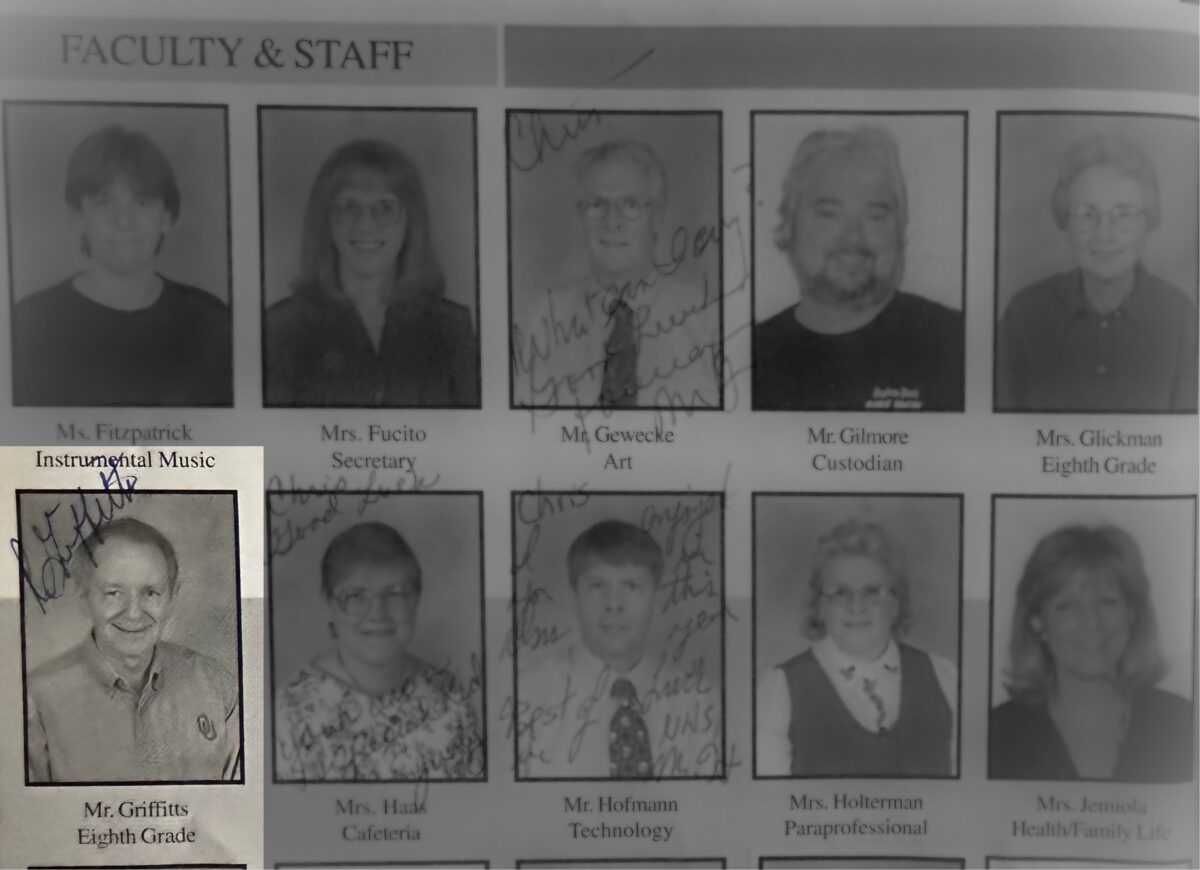Bob Griffitts was an ill-tempered, gravelly-voiced, Oklahoma-native, Vietnam vet-turned-middle-school-English teacher. For 30 years, he commanded the attention of small-town students by banging a wooden meter stick ruler on his old desk. He required pre-teens to diagram complex sentences on a chalkboard. He yelled. He was intolerant of tardiness. And I loved him.
Last month, Mr. Griffitts, as I knew him, died at the age of 82.
His passing sparked a wave of nostalgia-drenched social media posts from my former classmates. Just last week, someone dug up an assignment we did for our 8th grade yearbook: What career did we think we’d have in the future?
My hometown was small enough that our graduating class had fewer than 50 students, meaning our projections fit on a single page. Our responses had a perfect range. Many were what you might expect from young kids with limited life experience: We had boys who wanted to be in the NBA, NHL and MLB, even though I don’t remember any of them actually playing basketball, hockey or baseball. Two girls listed simply “superstar,” which must have been our version of Youtuber, a career path nearly a third of kids today are planning. A few of ours were impressively accurate — Sheakia wanted to be a doctor and became a nurse, Erica wanted to be a lab tech and now works at a pharma company.
A third group from that yearbook assignment stands out to me most of all: The classmates who had specific careers in mind but ended up in a different field. Teddy wanted to be an architect but is today a video game designer and Jackie projected she’d be a lawyer and instead is a pharmacist.
All of this maps perfectly to what education researchers call “alignment.”
A 2019 paper used longitudinal data matching childhood aspirations with career trajectories to find a remarkable correlation between how specific a kid’s educational and occupational plans were with their eventual outcomes. Kids exposed to the training and education necessary for an in-demand job — be it in the trades, tech, entrepreneurship or anything else — were more likely to wind up with an in-demand job, even if it was different than the one they imagined.
Money isn’t everything, but it is quantifiable, and the research shows kids with “alignment” earn 30% more than their “under-aligned” peers.
More surprisingly still: Having a clear career path is a better predictor of success than grades.
This is crucial for addressing our tech-skills shortfall. As Technical.ly has routinely reported, we need to expose more kids to these jobs, especially students from under-resourced communities who might not otherwise get the chance. Even if they wind up in a different sector, alignment boosts performance. Ya can’t be what ya can’t see, goes the old saw. Kids need exposure and influence.
That influence can come from anywhere that works — which brings me back to Mr. Griffitts.
I saw Mr. Griffits just once more after I graduated high school. I was close to finishing college and back where I grew up. I was visiting a friend who happened to live across the street from Mr. Griffitts. I got up the nerve to knock on his door. He remembered me, and I told him how much I appreciated him. I shared that I had taken an interest in journalism, and he said that sounded nice, that I was always a strong writer. It was just a couple minutes of pleasantries but it meant so much that I still recall it 15 years later.
I doubt I remembered even then what I listed in my middle school yearbook as the career I hoped to have. I saw it again just last week. By the research I know now, I had alignment, a specific dream that helped guide me as I got more experience. It’s so obvious now where I got the inspiration.
I wanted to be an English teacher.

This piece first appeared in Technically Media CEO Chris Wink’s Builders newsletter. It features tips on growing powerful teams and dynamic workplaces. Sign up to get more pieces like this in your inbox before they appear on our site.
Join our growing Slack community
Join 5,000 tech professionals and entrepreneurs in our community Slack today!
Donate to the Journalism Fund
Your support powers our independent journalism. Unlike most business-media outlets, we don’t have a paywall. Instead, we count on your personal and organizational contributions.

A founder’s vision comes alive at a showcase for Baltimore’s student entrepreneurs

Traditional PPE isn’t made for everyone. Here’s how one startup is fixing it.

Pittsburgh has all the resources to be the next big green energy hub — except the workers to make it happen



